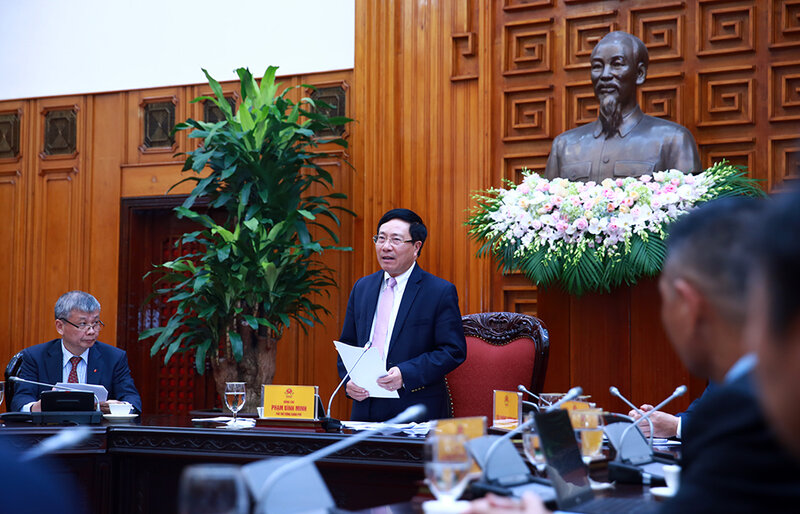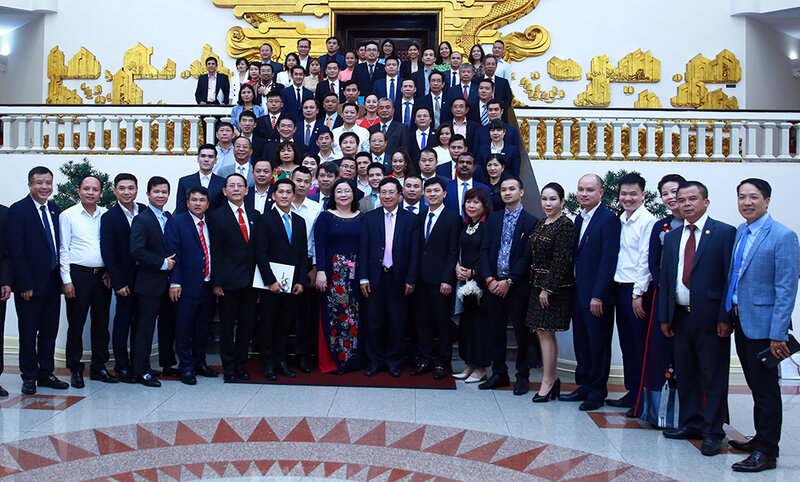Vietnam gov’t pledges to partner with business community to overcome Covid-19
Not only does the Vietnamese government provide supporting packages for the business community, it has also given priority to reforming administrative procedures for greater convenience for the public.
The Vietnamese government understands the severe impacts that the Covid-19 has caused to the business community, expecting both sides to form a strong partnership in overcoming this crisis, according to Deputy Prime Minister Pham Binh Minh.
| Deputy Prime Minister Pham Binh Minh at the meeting. Photo: VGP. |
As the pandemic is still wreaking havoc on the global economy, the fact that Vietnam has put the situation under control and achieved an economic growth rate of 2.12% in the first three quarters this year shows great efforts from both the government and local enterprises, said Mr. Minh at a meeting with the Vietnam ASEAN Economic Cooperation Development Association (VASEAN) on October 5.
The meeting attracted the participation of representatives from 85 major enterprises in Vietnam, as well as investors from ASEAN, Japan, South Korea and India.
The businesses at the event requested the government to continue reducing corporate income tax, value-added tax and land rental fees for enterprises in the 2020 – 2021 period.
Both local and foreign enterprises expected to receive more support from the government ahead of a shift in global investment capital in the post-pandemic period to stay well-prepared against any possible changes .
As Vietnam has been a member of a number of free trade agreements (FTA), including next-generation trade deals namely the Comprehensive and Progressive Agreement for Trans-Pacific Partnership (CPTPP) and the EU – Vietnam Free Trade Agreement (EVFTA), representatives of enterprises suggested that the government should better enforce laws on intellectual property rights and roll out additional relief packages for those affected by the pandemic.
| Delegates at the meeting. Photo: VGP. |
Deputy PM Minh said right in the second quarter, the government has contemplated the issuance of four resolutions on lowering and waiving land rental fees, corporate income tax, environmental protection tax, and raising personal income tax threshold in 2020.
Another key aspect that Mr. Minh, who is Minister of Foreign Affairs, mentioned was the government’s efforts to address shortcomings in administrative procedures and improve the business environment. So far, the government has removed and simplified 3,800 business conditions and 6,770 categories of goods subject to specialized inspection.
To date, nine countries in ASEAN have joined the ASEAN Single Window (ASW) mechanism, in which Vietnam has received over 179,000 certificates of origin (C/O) from ASEAN and sent 263,000 to others in the bloc.
In 2019, bilateral trade turnover between Vietnam and ASEAN stood at US$57 billion, a 10-fold increase against that of 25 years ago and accounting for 11% of Vietnam’s total trade revenue.
Vietnam is also an attractive investment destination for investors in ASEAN, with FDI from ASEAN to Vietnam standing at nearly US$82 billion as of July 2020, or 21.6% of total registered capital to Vietnam.
Mr. Minh urged Vietnamese enterprises to remain active in grasping opportunities from FTAs that Vietnam is a member of.
The Vietnam’s Deputy PM said the government is committed to protecting intellectual property rights. As such, the country has issued a strategy on intellectual property until 2030, he noted.














